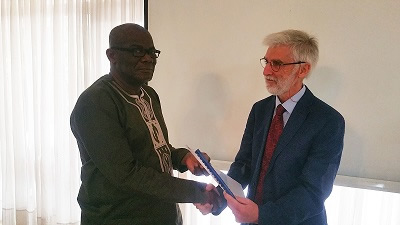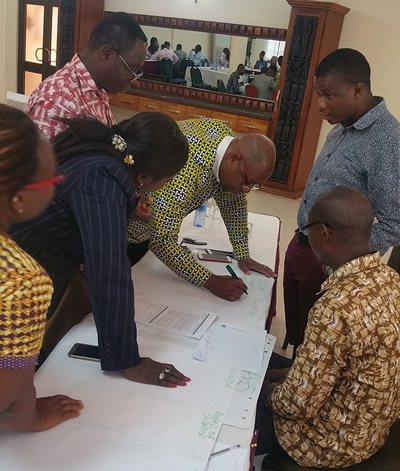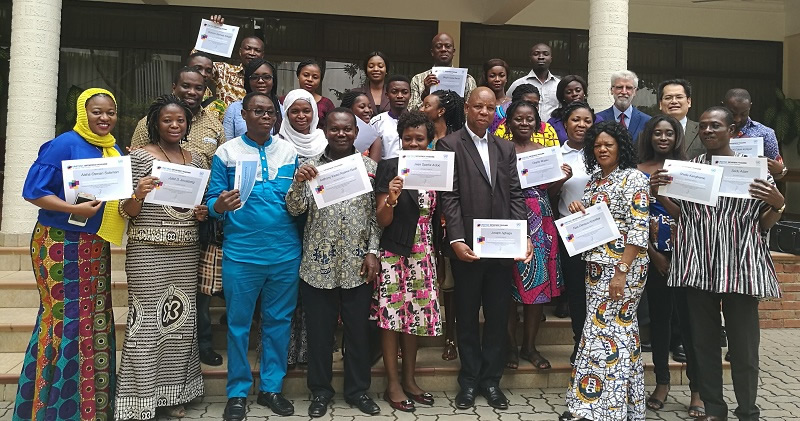On 15 September 2017, Mr. Dawarnoba Baeka, Chief Director of the Ministry of Trade and Industry (MOTI) of the Republic of Ghana, officially received the Ghana Trade Facilitation Roadmap.
This event marked the conclusion of the delivery of the UNCTAD Empowerment Programme for National Trade Facilitation Committees (NTFC) in Ghana, which was organized within the framework of the HMRC-WCO-UNCTAD Capacity Building Programme to assist countries in the implementation of the WTO Trade Facilitation Agreement.
The Programme was designed to empower Ghana NTFC to be in a better position to implement, in a coordinated manner, trade facilitation reforms, including the provisions of the Agreement on Trade Facilitation of the World Trade Organization (WTO).

After Sudan, Ghana became the second country to complete the UNCTAD Empowerment Programme for NTFCs, followed by Nigeria and Benin in October 2017.
The Programme in Ghana started with a kick-off workshop in February 2016, when the Ghana National Road Transport and Transit Facilitation Committee (NRTTFC) and other stakeholders, were introduced to the joint HMRC/WCO/UNCTAD capacity building program. The event allowed mapping key trade facilitation stakeholders in Ghana and raising awareness on the WTO Trade Facilitation Agreement (TFA).
In May 2016, the startup module of the Programme enabled operationalizing the Ghana National Trade Facilitation Committee. Through this event, members gained an insight into the trade facilitation benefits and impact on development and had the opportunity to explore their options on how to assimilate international best practices into the activities of Ghana NTFC. The event aimed at enhancing members' knowledge on the WTO TFA and assisting them in the process of ratifying the TFA Agreement and of classifying measures under categories A, B, and C for formal notification according to section II of the TFA.

Module one of the Programme was delivered in the late August 2016. Through this module, members of the Committee appreciated the wide range of existing international standards and legal framework pertinent to trade facilitation reforms, such as UN/CEFACT Recommendations and other UNECE tools, the WCO Revised Kyoto Convention, and the WTO TFA. Participants examined trade facilitation indicators as well as implications of trade facilitation for global supply chain management.
In November 2016, the second module of the Programme focused on measuring and implementing trade facilitation reforms in Ghana. On this occasion, members delved more into the readily available online statistical data and trends in measuring and benchmarking trade facilitation reforms in Ghana vis-à-vis other countries. Members were introduced to a result-based management approach in developing a workplan that was specific, measurable, achievable, relevant and time-bound. Participants also explored the essentials of single window, risk management, notification for enhanced controls or inspections and test procedures.

On 4 January 2017, Ghana became the 104th country that ratified the WTO TFA Trade Facilitation Agreement. Almost two months later, on 22 February 2017, the Agreement came into force after Rwanda, Oman, Chad and Jordan deposited their instruments, increasing the total ratifications beyond the required 110 to enter into force. From that day on, a sense of urgency to meet the WTO TFA provisions loomed.
Armed with new skills, members of Ghana NTFC embarked on developing a roadmap for Ghana trade facilitation reforms for the next five years. The draft roadmap was further developed in April 2017, during a workshop aimed at finding a common vision, supported with realistic and attainable goals and with clear and feasible related activities and indicators.
As a vision, all members of NTFC agreed that by the end of 2022, through improved efficiency and risk management, the trade facilitation reforms implemented in Ghana will:
-
Decrease the time for clearance of imports, exports and transit to 48 hours
-
Reduce the cost of Doing Business - cross border trade by 40%
-
Improve Ghana's ranking to be among the top 100 countries of the World Bank Doing Business - trading across borders
The roadmap also summarized Ghana's latest assessment of measures to be included in categories B and C, which are yet to be notified to the WTO.
A group of selected members of the NTFC was trained to become trainers during the last module of the Programme, which was delivered in September 2017. Under UNCTAD guidance, the group developed a Knowledge Transfer Strategy, which aimed at ensuring the sustainability of the Committee. It focused on improving knowledge sharing among current members of the NTFC, but also on ensuring knowledge transfer from current members to new members of the Committee. As part of the outcome of this event, the group finalized the Ghana trade facilitation roadmap and officially presented it to the Ministry of Trade and Industry (MOTI) signalling the commitment of the Ghana NTFC to follow through the direction for reforms set out in the document.




